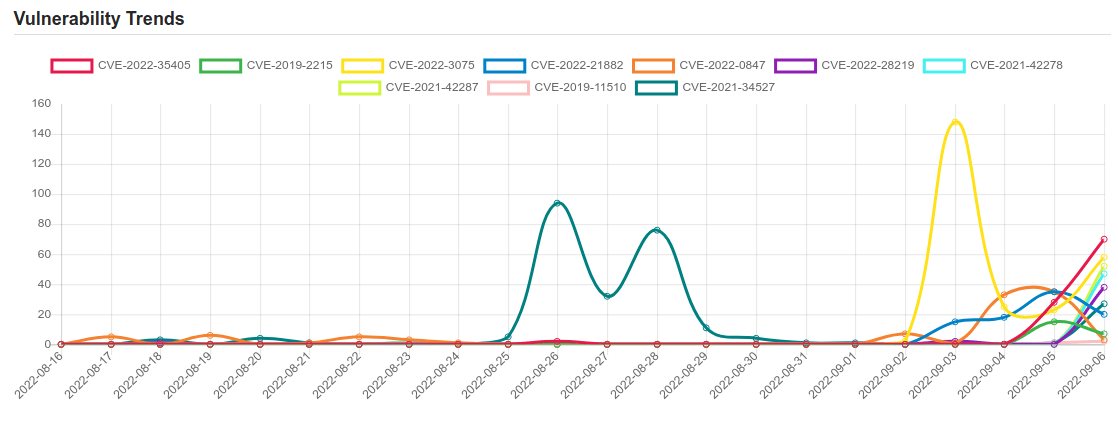Daily Vulnerability Trends: Wed Sep 07 2022

| CVE NAME | CVE Description |
| CVE-2022-2639 | An integer coercion error was found in the openvswitch kernel module. Given a sufficiently large number of actions, while copying and reserving memory for a new action of a new flow, the reserve_sfa_size() function does not return -EMSGSIZE as expected, potentially leading to an out-of-bounds write access. This flaw allows a local user to crash or potentially escalate their privileges on the system. |
| CVE-2020-10735 | No description provided |
| CVE-2022-34715 | Windows Network File System Remote Code Execution Vulnerability. |
| CVE-2022-27664 | In net/http in Go before 1.18.6 and 1.19.x before 1.19.1, attackers can cause a denial of service because an HTTP/2 connection can hang during closing if shutdown were preempted by a fatal error. |
| CVE-2022-32190 | No description provided |
| CVE-2022-30525 | A OS command injection vulnerability in the CGI program of Zyxel USG FLEX 100(W) firmware versions 5.00 through 5.21 Patch 1, USG FLEX 200 firmware versions 5.00 through 5.21 Patch 1, USG FLEX 500 firmware versions 5.00 through 5.21 Patch 1, USG FLEX 700 firmware versions 5.00 through 5.21 Patch 1, USG FLEX 50(W) firmware versions 5.10 through 5.21 Patch 1, USG20(W)-VPN firmware versions 5.10 through 5.21 Patch 1, ATP series firmware versions 5.10 through 5.21 Patch 1, VPN series firmware versions 4.60 through 5.21 Patch 1, which could allow an attacker to modify specific files and then execute some OS commands on a vulnerable device. |
| CVE-2022-36076 | NodeBB Forum Software is powered by Node.js and supports either Redis, MongoDB, or a PostgreSQL database. Due to an unnecessarily strict conditional in the code handling the first step of the SSO process, the pre-existing logic that added (and later checked) a nonce was inadvertently rendered opt-in instead of opt-out. This re-exposed a vulnerability in that a specially crafted Man-in-the-Middle (MITM) attack could theoretically take over another user account during the single sign-on process. The issue has been fully patched in version 1.17.2. |
| CVE-2022-2132 | A permissive list of allowed inputs flaw was found in DPDK. This issue allows a remote attacker to cause a denial of service triggered by sending a crafted Vhost header to DPDK. |
| CVE-2022-35405 | Zoho ManageEngine Password Manager Pro before 12101 and PAM360 before 5510 are vulnerable to unauthenticated remote code execution. (This also affects ManageEngine Access Manager Plus before 4303 with authentication.) |
| CVE-2019-2215 | A use-after-free in binder.c allows an elevation of privilege from an application to the Linux Kernel. No user interaction is required to exploit this vulnerability, however exploitation does require either the installation of a malicious local application or a separate vulnerability in a network facing application.Product: AndroidAndroid ID: A-141720095 |
| CVE-2022-3075 | No description provided |
| CVE-2022-21882 | Win32k Elevation of Privilege Vulnerability. This CVE ID is unique from CVE-2022-21887. |
| CVE-2022-0847 | A flaw was found in the way the “flags” member of the new pipe buffer structure was lacking proper initialization in copy_page_to_iter_pipe and push_pipe functions in the Linux kernel and could thus contain stale values. An unprivileged local user could use this flaw to write to pages in the page cache backed by read only files and as such escalate their privileges on the system. |
| CVE-2022-28219 | Cewolf in Zoho ManageEngine ADAudit Plus before 7060 is vulnerable to an unauthenticated XXE attack that leads to Remote Code Execution. |
| CVE-2019-11510 | In Pulse Secure Pulse Connect Secure (PCS) 8.2 before 8.2R12.1, 8.3 before 8.3R7.1, and 9.0 before 9.0R3.4, an unauthenticated remote attacker can send a specially crafted URI to perform an arbitrary file reading vulnerability . |
| CVE-2021-34527 | Windows Print Spooler Remote Code Execution Vulnerability |
| CVE-2022-30190 | Microsoft Windows Support Diagnostic Tool (MSDT) Remote Code Execution Vulnerability. |
| CVE-2022-31814 | pfSense pfBlockerNG through 2.1.4_26 allows remote attackers to execute arbitrary OS commands as root via shell metacharacters in the HTTP Host header. NOTE: 3.x is unaffected. |
| CVE-2021-42278 | CVE-2021-42278 – Microsoft / Windows – Privilege escalation |
| CVE-2021-42287 | CVE-2021-42287 – Microsoft / Windows – Privilege escalation |
A considerable amount of time and effort goes into maintaining this website, creating backend automation and creating new features and content for you to make actionable intelligence decisions. Everyone that supports the site helps enable new functionality.
If you like the site, please support us on Patreon using the button below

To keep up to date follow us on the below channels.




